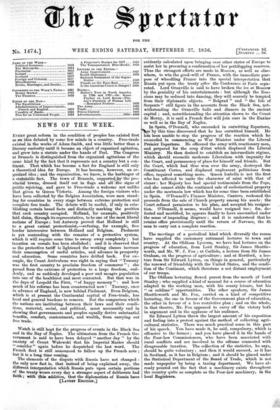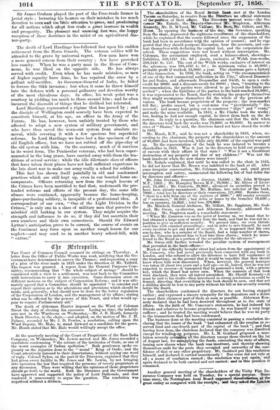The meetings of a periodical kind which diversify the recess
have supplied the customary autumnal lectures to town and country. At the Oldham Lyceum, we have had lectures on the progress of education, from Lord Stanley, Sir James Shuttle- worth, and Mr. W. J. Fox ; at Carlisle, a lecture from Sir James Graham, on the progress of agriculture ; and at Hertford, a lec- ture from Sir Edward Lytton, on things in general, particularly the renewal of friendship with the United States, and the condi- tion of the Continent, which threatens a not distant employment of our troops.
The Oldham lecturing flowed purest from the mouth of Lord Stanley ; who supplied a kind of manual for a course of education adapted to the working man, with his scanty leisure, but his " os sublime" opportunities. The other speakers, Sir James Shuttleworth and Mr. Fox, carried on a kind of competitive lecturing, the one in favour of the Government plan of education, the other in favour of a less restrictive plan ; and on the whole, in that theatre, Mr. Fox appeared to carry off the victory both in argument and in the applause of his audience.
Sir Edward Lytton threw the largest amount of his exposition and feeling into a protest against the method of collecting agri- cultural statistics. There was much practical sense in this part of his speech. You have made it, he said, compulsory, which is offensive to the farmer ; and you have placed it in the hands of the Poor-law Commissioners, who have been associated with rural conflicts and are involved in the odiums connected with disagreeable taxation. The collection of the statistics, he says, should be quite voluntary ; and then it would succeed, as it has in Scotland, as it has in Belgium ; and it should be placed under the Statistical Department of the Board of Trade, which is not made unpopular by being a taxing department. We have al- ready pointed out the fact that a machinery exists throughout the country quite as"complete as the Poor-law machinery, in the local Registrars. Sir James Graham played the part of the Free-trade farmer in jovial style ; lecturing his hearers on their .mistakes in too much devotion to corn and the little attention to'grass, and proclaiming for all nations which adopt free trade a great increase in wealth and prosperity. The pleasant and amusing fact was, the happy reception of these doctrines in the midst of an agricultural din- ner-party.



























